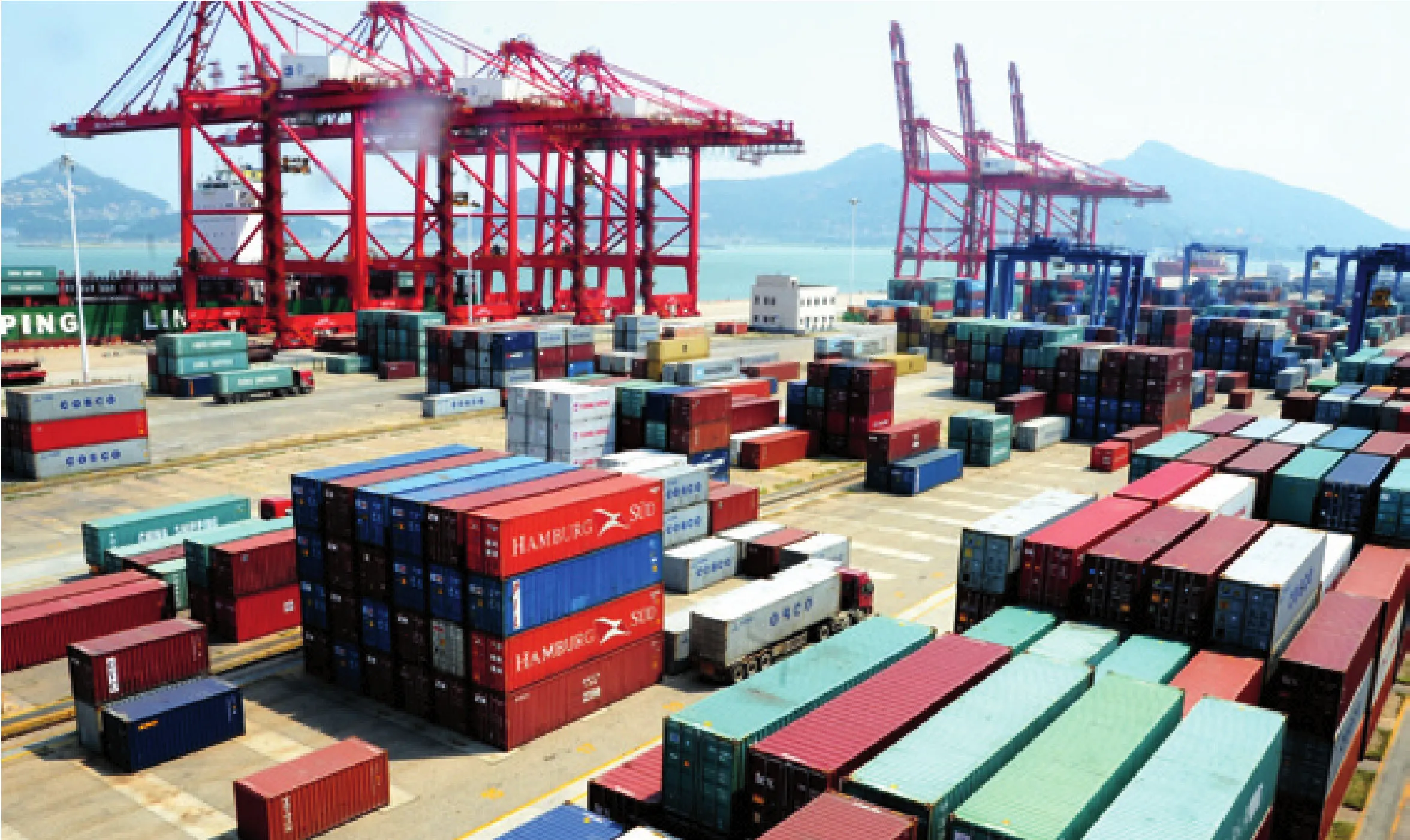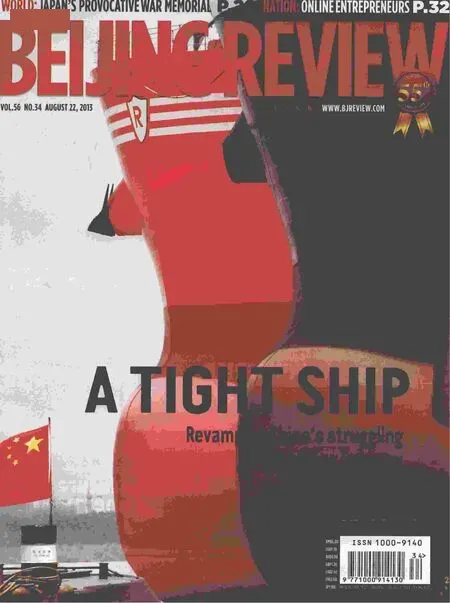promoting Trade Foreign trade can play a bigger role in ensuring stable economic growth
2013-12-07ByLanXinzhen
By Lan Xinzhen
Change is coming to the world of e-commerce in China, and it is being driven by foreign trade.The Ministry of Commerce(MOFCOM) is taking the lead, along with the General Administration of Customs (GAC), the Ministry of Finance and the Ministry of Industry and Information Technology, in formulating a policy supporting the development of foreign trade through e-commerce.
E-commerce has become a major channel for domestic consumption, with a rising proportion in the total sales of consumer goods. But e-commerce has developed slowly in the realm of foreign trade.
According to the GAC, China’s foreign trade grew by 7.8 percent year on year in July.Although monthly growth picked up, it remained at just one third of the growth seen at the start of the year. In January, foreign trade was up by 26.7 percent.
The MOFCOM said in a statement that as an emerging sales channel and trade form, ecommerce breaks through the restrictions of traditional foreign trade sales and is conducive to shortening trade chains, building up independent marketing channels and nurturing new growth points of foreign trade.
In addition to e-commerce, the Chinese Government is also promoting the development of foreign trade in all possible ways,including exempting quarantine fees and simplifying customs clearance procedures.
On August 15, the General Administration of Quality Supervision, Inspection and Quarantine and the GAC declared export quarantine exemptions for 1,507 items. According to the GAC estimation, these commodities account for 70.43 percent of the total commodities subject to quarantine, and $44.64 million worth of products will be exempted.
China’s foreign trade has been declining this year—the trade volume even saw a 2-percent decrease in June, adding to fears that the target of 8-percent growth in foreign trade won’t be realized. The sluggish trade situation also has an adverse economic impact. The export-oriented economic path China has adopted since the reform and opening up some 30 years ago seems to be coming to an end, and ensuring other stable means of growth is a thorny issue for top Chinese decision-makers.
China’s slowing economic growth—although in line with government plans to restructure the economy—is unquestionable.In the second quarter, the Chinese economy grew by 7.5 percent over a year ago, which was 0.2 percentage points lower than the rate in the first quarter, hitting the minimum target for growth set by the Central Government at the beginning of this year.
Wang Yiming, Executive vice President of the Academy of Macroeconomic Research under the National Development and Reform Commission, said the Chinese economy is moving away from the era of double-digit growth.
Foreign trade, which used to be a major driving force for the Chinese economy, is now surprisingly holding back economic growth.Wang said that when investment has already contributed heavily to economic growth, merely stimulating domestic consumption will not be enough. The government should reinvigorate foreign trade as a primary means of ensuring stable growth, because foreign trade has a bigger space for recovery than consumption and investment do.
Not easy

READY TO BE SHIPPED: Containers pile up in the Lianyungang Port in east China’s Jiangsu Province
Boosting foreign trade is a challenge. Zheng Yuesheng, spokesman for the GAC, said the biggest challenge facing China is weak external demand dampening its exports. In the Global Economic Prospects report released in June, the World Bank lowered its expectations on global economic growth in 2013 from 2.4 percent to 2.2 percent. Economic growth in developed countries is expected to fall from 1.3 percent to 1.2 percent, while that of developing countries is expected to drop to 5.1 percent from 5.5 percent.“Sluggish external demand has directly caused the decline of orders from Chinese exporters, restraining growth,” said Zheng.
According to the GAC, among the 2,000 exporting enterprises that have been surveyed monthly since the start of the year, each month more than 45 percent reported their export orders have dropped this year. The survey in June showed that 49.2 percent of the enterprises saw shrinking orders.
Growing export costs due to foreign exchange rates and labor costs have also worsened the situation. According to the People’s Bank of China, the country’s central bank, by August 8, the yuan’s rate against the U.S. dollar has appreciated by 2 percent from the end of last year. In the meantime, labor costs in China are rising. In the first half of this year many provinces, autonomous regions and municipalities raised their minimum wages. Among the nearly 2,000 enterprises subject to the GAC’s monthly survey, 70 percent of them said cost pressure was growing and their products were less competitive.
Trade frictions have intens ified, deteriorating China’s trade environment. The MOFCOM figures showed that in the first quarter 12 countries launched 22 trade investigations against China. “Both countries and products involved in trade frictions are becoming more diverse, seriously affecting China’s exports of competitive products,” said Zheng.
A slowdown in domestic industrial production has also curbed demand for raw material imports. According to the National Bureau of Statistics, in June, added value completed by industrial enterprises whose annual sales revenue is over 20 million yuan($3.27 million) grew by 8.9 percent over a year ago, which was 1 percentage point lower than the rate at the beginning of this year. Industries with surplus capacity, such as steel, cement, shipbuilding and solar panels,keep seeing their pro fits decrease.
“In the second half of the year China’s foreign trade will still be volatile and full of difficulties and challenges,” Zheng said. “Therefore China should continue to transform its growth pattern with the aim of ensuring that Chinese products don’t lose their share in the global marketplace.”
Recovery expected
Nie Linhai, Deputy Director of the MOFCOM’s Department of Electronic Commerce and Informatization, said the formulation of policies involving e-commerce platforms for foreign trade should focus on better facilitating exporting enterprises to tackle customs.
On July 24 the State Council’s executive meeting proposed six measures on promoting foreign trade development. Small and mediumsized private enterprises are mainly supported,because their orders are small, traditional ways of providing services to them are of low efficiency and e-commerce platforms will get more opportunities.
At present there are nearly 1,000 foreign trade e-commerce websites in China, but only fewer than 10—such as Dhgate and Alibaba’s Aliexpress—are big-sized ones. According to DHgate figures, in 2012 China’s foreign trade e-commerce websites realized sales revenue of nearly $10 billion. Compared with the $3.8 trillion in total foreign trade volume, this is tiny.
But this is the right opportunity for foreign trade e-commerce enterprises. In the first half of the year, China’s cross-border e-commerce enterprises were not affected despite the depressed foreign trade market. Instead, their development was even more vigorous.
Nie said the recent foreign trade policies and future policies supporting development of foreign trade e-commerce enterprises are aimed at reducing customs clearance costs and speeding up clearance procedures. These will directly provide a boost to China’s exports.
Song Hong, Director of International Trade Division of the Institute of World Economics and Politics under the Chinese Academy of Social Sciences, said change to foreign trade will reduce costs for exporting enterprises and drive up exports. China’s foreign trade is expected to recover in the upcoming months.
Song thinks in the second half of the year there will be some positive news for China’s exports because the external environment is improving. The U.S. economy is currently showing signs of getting back on track.
However, imports may not improve sign ificantly because of weak domestic demand. ■
杂志排行
Beijing Review的其它文章
- Mind Your Own e-Business! More job hunters start business careers on the Internet
- Seeking a Cure Cities are upgrading drainage systems to battle chronic flooding
- ABANDON SHIp ? NOT SO FAST China is set to revitalize its beleaguered shipbuilding sector?
- Trying a New Way Beijing NGO launches a charity program to encourage carpooling
- Who Wants to Be Number Two?Imagining a future beyond the superpower paradigm
- A Needed Reform Interest rates must be fully liberalized to meet the demands of the market
